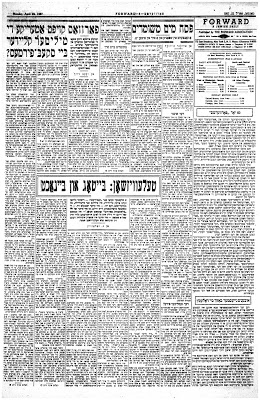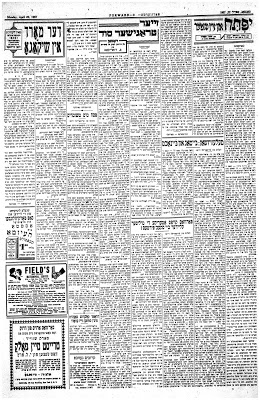Passover with Apostates: A Concert in Spain and a Seder in the Middle of the Ocean by Elie Wiesel (1957)
Passover with Apostates:
A Concert in Spain and a Seder in the Middle of the Ocean
By Eliezer Wiesel
Forverts (22 April 1957) [Yiddish]
If someone says to you that Passover is the festival of redemption not only of a nation but of each individual, believe him;
If someone explains to you that a Jew remains a Jew deep at heart, despite the masks he is often forced to wear, do not doubt him;
If someone tells you that, no matter what a Jew does, he will remain a living legacy of his people and his past, nod your head and say: True!
I ask that the skeptics among you listen to a story that happened to me a few years ago.
However, I must warn you: I know the beginning and middle of the story; the end, I do not know to this day.
The Drunkard
In 1949, I traveled to Spain on assignment, spending several weeks crisscrossing the country, chatting with ordinary citizens as well as circumspect politicians, and seeking out here and there Jews and vestiges of Jewish life from the time of the Inquisition.
I found both Jews and tragic remnants of the Jewish past in that country of Judah Halevi and Samuel ha-Naggid.
However, the most interesting among them I encountered by chance, not in a museum or in Jewish company but in a cabaret.
Spanish colleagues, who brought me to Madrid and wished to show me the nightlife of the capital, led me to a cabaret, where overstuffed rich people came to admire flamenco performers who, in dancing and gyrating their bodies to some crazy rhythm, seemed as though they had been possessed by a dybbuk.
I do not know why my gaze, which wandered not only to the stage but also throughout the hall, suddenly fixed on a man in his 40s, who was sitting alone not far from us and did not stop drinking whiskey.
Perhaps the drunkard drew my interest and curiosity because I have met many drunkards in my life, but this one was different.
Most drunkards drink to forget; he drank to remember. So it seemed to me, based on the way in which he held the glass in his hand, brought it to his lips, and placed it back on the table.
He had a gentle face with a high, wrinkled forehead; thick eyebrows hanging over dark, mournful eyes; and delicate hands with fingers ranging from long to extremely long.
We sat in the cabaret for three hours, but, for all his drinking, the drunkard did not get sleepy.
My curiosity grew by the minute until I could no longer contain it. I called over the waiter and asked him who our bizarre neighbor was.
“Oh, you must mean Paul,” the waiter replied.
“Good, now I know his name,” I answered, “but who is he?”
The waiter smiled: “Wait a bit, be patient for a couple hours. Then you will see something you will not forget for the rest of your life. Wait, señor, it’s worth it…”
I wanted to question him further, but other guests summoned him. We had no choice but to wait.
The Divine Violin
In the meanwhile, the dancers grew tired from their dancing and the music itself began to die down.
The cabaret slowly started to empty out and a sudden gloom overtook this hall, to which people would come seeking false happiness and hollow illusions.
Our drunkard continued to knock back one glass after another, as if he had decided to drown himself, his life and his sadness, in the ever-full, ever-empty glass he held in his hand.
Suddenly, he gave the waiter a wink, and the latter understood what the guest wanted from him.
The waiter approached the stage, where the orchestra was playing sentimental melodies, and returned to the drunkard’s table with a violin in hand.
The drunkard took the violin, and a deathly silence descended upon the hall. All eyes were trained on him, on this elegant drunkard, who, eyes closed, stroked the bow for a long while, his face glowing as though flames were about to burst out of his head into the night.
Then he began to play.
And I shuddered.
I have heard many virtuosos in my lifetime, among them some of the most famous and talented.
But I had never heard anything like this.
Suddenly, it seemed to me that the cabaret had been transformed into a temple where he, the cantor, sought to purify his soul and ours in the blue sea of musical notes, of divine songs and harmonies.
I do not recall how long he played. I only remember that the impromptu concert was suddenly cut short and I was unable to catch a glimpse of the violinist, since he had already left the cabaret.
The magic came to an end, disappeared, and everything happened so quickly that I could barely believe it had been anything more than a dream.
The waiter then approached and told us that the drunkard comes every evening to the same cabaret, drinks his fill, and once he is good and plastered, he takes the violin and gives a free concert – for himself.
Who was he, this Paul? A German Jew, before the war he was a violinist who gave concerts. Hitler deported him to a concentration camp where he played in the camp orchestra. After the war, he was no longer up to performing in public. He came to Madrid in 1945-46. He had enough money – presumably from wealthy relatives. Many people suggested that he again give concerts, but he can only play when he is drunk.
That story left me then with a terrible impression. I decided to return to the cabaret the next day. But at the hotel a cable was waiting for me directing me to make a short trip to Tangier.
Two years later, I again visited Madrid and went to the same cabaret, but Paul was no longer there. They informed me that he had traveled to settle in Israel.
Apostates at the Seder
Three years ago, I celebrated Passover on a French ship, somewhere in the middle of the ocean between Brazil and Argentina.
We observed the Seder as it should be done. More than fifty people were seated at the table. But not all of them were Jews: thirty of them were… apostates.
The State of Israel was then going through difficult times, and Christian missionaries had arrived to buy up Jewish souls. Anyone who agreed to apostatize received a visa to Brazil and food for the journey.
Several hundred Jews left Israel then, having allowed themselves to be persuaded by the missionaries.
On a beautiful day, I took the French ship Provence and sailed to Brazil to see how the apostates were living there.
I knew that a couple dozen apostate Jews were traveling on that same ship, but I did not have access to them. First of all, the ship was large (with more than a thousand passengers), and go ask someone if he was not only not a Jew but an apostate! Second of all, the officers told me that many passengers almost never leave their cabin, so how is one supposed to go in to see them and ask indiscreet questions?
To my “luck,” a dramatic incident took place in Brazil: in Rio de Janeiro, the Immigration Authority refused to recognize the apostates’ entrance visas (to this day, no one knows why), and they were not allowed off the ship. According to international maritime law, the Provence had to bring them back to Marseilles, France. But because the ship was first traveling to Buenos Aires, they locked the apostates in the ship’s cellar and held them there under arrest.
I myself was supposed to disembark in Brazil, but immediately upon hearing about the incident, the journalist in me decided to travel on with these unhappy Jews to chronicle their suffering.
In the meanwhile, Passover sneaked up on us and I received permission from the ship’s captain to lead a Seder. The announcement came over the megaphone that those Jews who so wished could have a special “service” after dinner, as required by Jewish law.
I did not expect the apostates to come. But come they did. They numbered thirty-something: men, women, children. They sheepishly entered the coach dining hall and silently sat down at the table, where matzos and kosher wine symbolized their connection to the old traditions of the Jewish people.
At that moment, I remembered our Sages. Even at the gates of Hell, they said, a wicked person can repent. And they were correct, our Sages. It is enough that he witness an old-time Passover Seder for even the worst apostate to free himself of his shackles.
It goes without saying that I was in seventh heaven, sitting together at the table with Jews who had returned, reading the Haggadah.
But the greatest shock came a few minutes later. The door opened and there stood… Paul.
He did not appear drunk. But his eyes were cloudy. He came to the table, sat down, and… was silent.
After the Seder, I tried to have a conversation with him, but I could not extract anything from him.
One thing I understood more from his silence than from the few words he uttered: the Jew in him had remained.
…On the return from Argentina, thanks to the intervention of Jewish organizations in Brazil, they allowed the apostates off the ship.
Paul also left the ship, and in Brazil he escaped my eye.
I warned you: I do not know the end of this story. I have no idea what happened to Paul and the other apostates.
I know only this: if someone tells you that Passover is the festival of redemption not only of a nation but of each individual, believe him.





One thought on “Passover with Apostates: A Concert in Spain and a Seder in the Middle of the Ocean by Elie Wiesel (1957)”
I simply want to tell you that I’m new to blogging and truly savored you’re web blog. Probably I’m want to bookmark your website . You definitely have excellent stories. Thank you for sharing with us your web site.